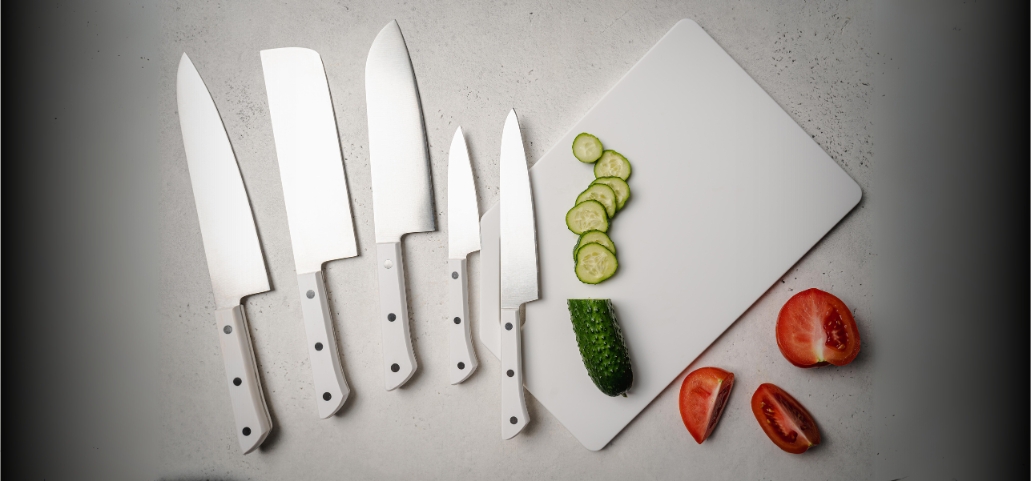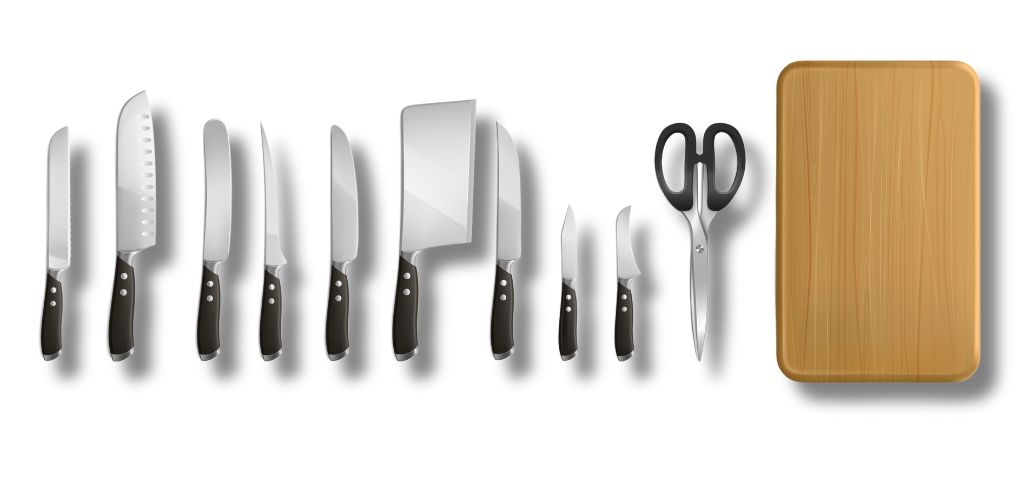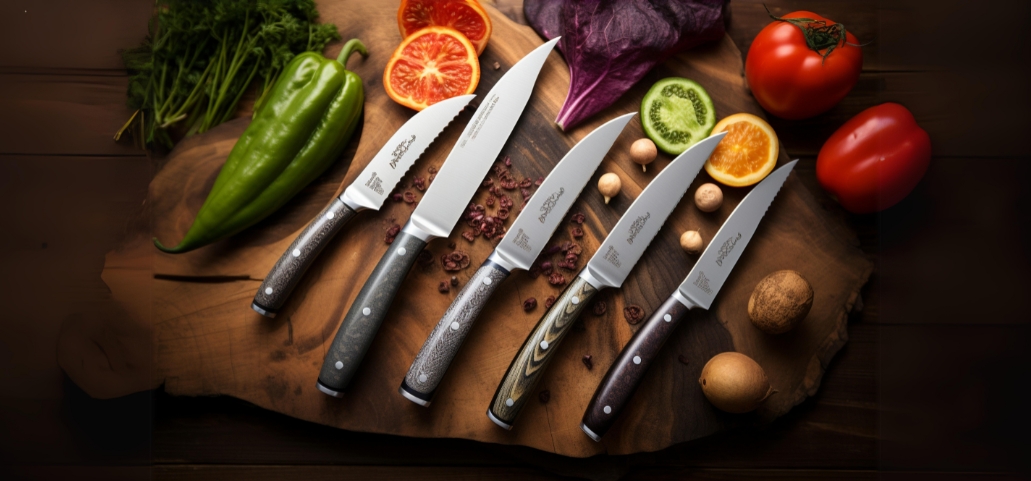Knowing how to dispose of kitchen knives correctly is essential to prevent injuries and reduce landfill waste. Many individuals are unclear about the proper manner to dispose of kitchen knives. Throwing them in the trash can be dangerous for sanitation workers and leaving them lying around can pose a threat to pets and children. The correct techniques for getting rid of kitchen knives will be covered in this book. So let’s dive in and explore how to dispose of kitchen knives.
Why Proper Disposal is Important
Kitchen knives should be disposed of properly to prevent major injuries. When thrown in the trash, they can harm sanitation workers who are handling the trash bags. Moreover, leaving them lying around can cause accidental cuts and injuries to pets and children.
The ecology is also negatively impacted by incorrect kitchen knife disposal. Landfill-deposited knives are a source of pollution and require a considerable amount of time to break down.
You can contribute to environmental preservation while also guaranteeing the safety of others by disposing of kitchen knives correctly.
Safe and Sustainable Methods for Knife Disposal

Kitchen knives, when not properly disposed of, can contribute to environmental pollution, landfill waste, and even cause accidental injuries. It is crucial to select the best disposal technique for them in a way that is safe and considerate to the environment.
Understanding the Environmental Impact:
When kitchen knives are disposed of improperly, they frequently wind up in landfills, where they can take decades to break down. The materials used in knives, such as stainless steel, plastic, and wood, can add to the growing problem of landfill waste. Furthermore, the production of new knives from raw materials consumes significant resources and energy, leading to resource depletion.
Safe Disposal Options:
- Recycling: Recycling is one of the best ways to dispose of kitchen knives sustainably. It guarantees that the materials are put to better use, which lowers the demand for fresh raw materials.
- Donating: Giving the knives to community kitchens or nonprofit organizations can be a terrific idea if they are still in good shape.
- Upcycling: For those who enjoy DIY projects, upcycling old knives into new tools or decor items can be a creative and eco-friendly choice.
Method 1: Recycling Kitchen Knives
Recycling kitchen knives is a straightforward process but requires some specific steps to ensure safety and proper handling.
Finding a Recycling Center:
Find a recycling facility that takes metal objects first. Many local recycling programs or scrap metal facilities will take kitchen knives. You can use online directories or contact your city’s waste management department for information on nearby recycling centers.
Preparing Knives for Recycling:
Before taking your knives to a recycling center, it’s crucial to ensure they are safely packaged to prevent any accidents.
- Wrap the Blade: Carefully wrap the blade in newspaper, bubble wrap, or a piece of cardboard, securing it with tape. By doing this, the packing will not be cut by the blade.
- Label the Package: To notify the handlers of the contents, clearly label the package with the words “sharp” or “knives.”
- Transport Safely: Place the wrapped and labeled knives in a sturdy box or container for transport to the recycling center.
Method 2: Donating Old Knives
Donating your kitchen knives is a great way to offer them a second chance at life if they are still in good condition and you no longer need them.
Choosing the Right Organization:
Not all charitable organizations accept knife donations, so it’s important to do some research first. Look for community kitchens, shelters, or non-profits that provide cooking classes or meals for those in need. Contact them to confirm whether they accept knife donations.
Preparing Knives for Donation:
- Clean Thoroughly: Ensure the knives are cleaned and sanitized before donating them.
- Secure Packaging: Just like with recycling, wrap the blades securely in newspaper, bubble wrap, or cardboard. To ensure the wrapping stays in place, use tape.
- Contact the Recipient: To arrange for the knives to be dropped off or picked up, get in touch with the organization. Provide clear labeling on the package to indicate its contents.
Method 3: Upcycling Kitchen Knives
Repurposing old items into new and useful goods is known as upcycling. It is a creative way to give your old kitchen knives a new life, reducing waste and promoting sustainability.
Ideas for Upcycling Kitchen Knives:
- Garden Markers: Use old knives as markers for your plants by painting or labeling them with plant names.
- Knife Block: Drill holes into a wooden block and insert old knives to create a unique and functional knife holder.
- Hand Tools: Use the blades of kitchen knives as hand tools for gardening or crafting projects.
- Art Pieces: Incorporate old knives into art pieces by painting or decorating them for a unique and eco-friendly home decor.
How to Dispose of Kitchen Knives UK

In the UK, it is not recommended to dispose of kitchen knives in regular household waste bins due to safety concerns and environmental considerations. Instead, follow these guidelines for safe and sustainable disposal:
- Recycling: Most recycling centers in the UK accept metal items such as kitchen knives. Before dropping them off, make sure to wrap the knives securely in thick paper or cardboard to prevent injuries to the handling workers.
- Donating: If your knives are in decent enough shape to donate, think about it. Look for charities or organizations that specifically deal with kitchenware donations. Many shelters, community kitchens, or non-profit organizations may appreciate your contribution.
- Surrendering to the Police: In some areas, local police stations may have knife amnesty bins where you can surrender old knives anonymously. This option not only ensures safe disposal but also helps in reducing the number of potentially dangerous items in the community.
By following these steps, you can safely and responsibly dispose of your kitchen knives while contributing to community safety and environmental sustainability.
Environmental Impact of Knife Disposal
The ecology may be greatly impacted by the improper disposal of kitchen knives. The increasing issue of trash and resource depletion is exacerbated by knives that wind up in landfills. The production of new knives also leads to the consumption of resources and energy, further contributing to environmental degradation.
Furthermore, disposing of sharp knives in regular household waste bins can pose a risk to sanitation workers and waste management facilities. They may result in accidents and equipment damage, raising the possibility of more expenses and safety risks.
The environmental damage caused by disposing of knives can be minimized while encouraging circularity and resource conservation by selecting sustainable disposal methods like recycling, donating, or upcycling. On the path to structure a more sustainable future for our planet , it is a humble but important step. So, next time you need to get rid of old kitchen knives, consider these alternative methods instead of throwing them away in the trash. Let’s all contribute to the cause of sustainability and trash reduction.
Knife Disposal Safety Tips
Safety should always be a priority when disposing of kitchen knives. Here are some useful hints for packaging and handling that will guarantee safety.
Handling Old Knives:
Handle old knives with care, using proper safety gear like gloves to avoid cuts. The blade should always be pointing away from your body and other people.
Packaging for Disposal:
- Wrap Carefully: Use thick materials like cardboard, bubble wrap, or multiple layers of newspaper to wrap the blade securely.
- Use Durable Containers: Place the wrapped knives in a sturdy box or container to prevent punctures and ensure safe transport.
- Label Clearly: Clearly label the package to indicate that it contains sharp objects.
Preventing Injuries:
Avoid disposing of knives in regular household trash where they could harm sanitation workers or others who may come into contact with them. Always use designated recycling centers or donation programs.
Conclusion
Disposing of kitchen knives safely and sustainably is essential for protecting the environment and preventing injuries. Reducing landfill waste and saving resources are achieved by recycling, donating, or upcycling old knives. Remember to handle and package knives carefully to ensure safety throughout the disposal process. Share this post with your fellow kitchen enthusiasts and eco-friendly consumers to spread the word about sustainable kitchen practices. When we work together, we can significantly lessen our environmental impact.
Frequently Asked Questions
Q1: How to dispose of kitchen knives safely?
Answer: When disposing of kitchen knives, it is essential to handle and package them carefully. Use thick materials like cardboard, bubble wrap, or multiple layers of newspaper to securely wrap the blade. After wrapping the knives, put them in a strong box or other container and mark them as sharp items. Avoid disposing of knives in regular household trash and opt for designated recycling centers or donation programs instead.
Q2: Can kitchen knives be recycled?
Answer: Yes, most recycling centers accept metal items such as kitchen knives. But be sure to wrap them well, and inquire about special instructions from your local facility.
Q3: What is upcycling and how can I upcycle my old kitchen knives?
Answer: Repurposing old items into something new and useful is known as upcycling. You can upcycle your old kitchen knives by incorporating them into art pieces, using the blades as hand tools for gardening or crafting projects, or even creating a unique knife block by drilling holes into a wooden block and inserting the knives. There are countless options! Use your imagination to breathe new life into your old knives.
Q4: Are there any organizations or charities that accept donations of old kitchen knives?
Answer: Yes, there are many non-profit organizations and community kitchens that appreciate donations of kitchenware. Seek out local charity that specialize in receiving donations of kitchen items. You can also check online for donation programs that accept kitchen knives.
Disclaimer: The information in this blog post is intended only as general guidance. Always check with local recycling centers, charitable organizations, and safety guidelines in your area for specific instructions on disposing of kitchen knives.
Personal Experience: I first learned about the importance of eco-friendly knife disposal when I accidentally cut myself while trying to throw away an old kitchen knife. I became aware of the importance of appropriate disposal techniques after that incident. Since then, I’ve been committed to finding sustainable ways to handle kitchen waste, and I hope this guide helps you do the same.
Why Trust Our Content?
Our content is thoroughly researched and written by experts in sustainable living and kitchen practices. Our goal is to offer precise and useful guidance to support you in making wise choices. Plus, we’re passionate about promoting eco-friendly habits and ensuring that our readers have access to reliable information.

